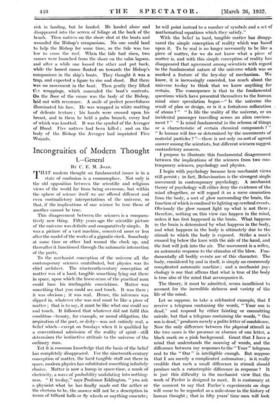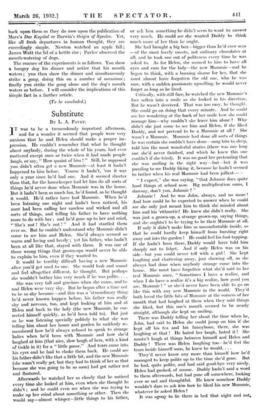Incongruities of Modern Thought I.—General
By C. E. M. Joao.
rIIHAT modern thought on fundamental issues is in a state of confusion is a commonplace. Not only is the old opposition between the scientific and religious views of the world far from being overcome, but within the sphere of science itself we are offered different and even contradictory interpretations of the universe, so that, if the implications of one science he true those of another -cannot be true.
This disagreement between the sciences is a compara- tively new thing. Fifty years ago the scientific picture of the universe was definite and comparatively simple. It was a picture of a vast machine, conceived more or less after the model of the works of a gigantic clock. Somebody at some time or other had wound the clock up, and thereafter it functioned through the automatic interaction of the parts.
To the mechanist, conception of the universe all the contemporary sciences contributed, but physics was its chief architect. The nineteenth-century conception of matter was of a hard, tangible something lying out there in space, upon which the horse-sense of the practical man could base his irrefragable convictions. Matter was something that you could see and touch. It was there ; it was obvious ; it was real. Hence, the inference was slipped in, whatever else was real must be like a piece of matter ; that is to say, it must be like what one could sec and touch. It followed that whatever did not fulfil this condition—beauty, for example, or moral obligation, the inspiration of the poet, or deity—was not entirely real, a belief which—except on Sundays when it is qualified by a conventional admission of the reality of spirit—still determines the instinctive attitude to the universe of the ordinary man.
Yet it is common knowledge that the basis of the belief has completely disappeared. For the nineteenth-century conception of matter, the hard tangible stuff out there in space, modern physics has substituted something infinitely elusive. Matter is now a hump in space-time, a mush of electricity, a wave of probability undulating into nothing- ness. " If to-day," says Professor Eddington, " you ask a physicist what he has fmally made out the nether or the electron to be, the answer will not be a description in terms of billiard balls or fly wheels or anything concrete;
he will point instead to a number of symbols and a set of mathematical equations which they satisfy."
With the belief, in hard, tangible matter has disapp- eared the simple conception of reality which was based
upon it. To be real is no longer necessarily to be like a piece of matter, for we do not know what a piece of matter is, and with this simple conception of reality has disappeared that agreement among scientists with regard
to the fundamental nature of the universe which was so marked a feature of the hey-day of mechanism. We know, -it is increasingly conceded, too much about the universe to-day to think that we know anything for certain. The consequence is that to the fundamental questions which have presented themselves to the human mind since speculation began—" Is the universe the result of plan or design, or is it a fortuitous collocation of atoms ? " " Is life the reality of the universe, or an incidental passenger travelling across an alien environ- ment " Is mind fundamental in the scheme of things or a characteristic of certain chemical compounds ? ". " Is human will free or determined by the movements of material particles ? "—there is not only no sort of agreed answer among the scientists, but different sciences suggest contradictory answers.
I propose to illustrate this fundamental disagreement between the implications of the sciences from two con- temporary sciences, psychology and physics.
I begin with psychology because here mechanist views still persist ; in fact, Behaviourism is the strongest single movement in contemporary psychology. A mechanist theory of psychology will either deny the existence of the, mind altogether, or will regard it as a mere- emanation from the body, a sort of glow surrounding the brain, the function of which is confined to lighting up cerebral events. Obviously the glow cannot light up what is not there ;- therefore, nothing on this view can happen in the mind, unless it has first happened in the brain. What happens in the brain is determined by what happens in the body, and what happens in the body is ultimately due to the stimuli to which the body is exposed. Strike a man's crossed leg below the knee with the side of the hand, and the foot will jerk into the air. The movement is a reflex, an automatic response to the stimulus of the blow. Fun- damentally all bodily events are of this character. The body, considered by and in itself, is simply an enormously complicated automatic machine ; and a mechanist psy- chology is one that affirms that what is true of the body is true also of the mind that accompanies it.
The theory, it must be admitted, seems insufficient to account for the incredible richness and variety of the life of the mind.
Let us suppose, to take a celebrated example, that I receive a telegram containing the words, " Your son is dead," and respond by either fainting or committing suicide, but that a telegram containing the words, " Our son is dead," produces merely a polite letter of condolence. Now the only difference between the physical stimuli in the two cases is the presence or absence of one letter, a black mark on a pink background. Grant that I have a mind that understands the meaning of words, and the difference between my responses to the " Your" telegram and to the " Our " is intelligible enough. But suppose that I am merely a complicated automaton ; is it really credible that such a small difference in stimuli should produce such a catastrophic difference in response ? It is just this difficulty in the mechanist view that the work of Pavlov is designed to meet. It is customary at the moment to say that Pavlov's experiments on dogs will come to be regarded as a mile-stone in the history of human thought ; that in fifty years' time men will look back upon them as they do now upon the publication of Marx's Das Kapital or Darwin's Origin of Species. Yet, like all fresh departures in human thought, they are exceedingly simple. Newton watched an apple fall ; James Watt the lid of a kettle rise ; Pavlov observed the mouth-watering of dogs.
The essence of the experiments is as follows. You show a hungry dog his dinner and notice that his mouth waters ; you then show the dinner and simultaneously strike a gong, doing this on a number of occasions ; finally you strike the gong alone and the dog's mouth waters as before. I will consider the implications of this Simple fact in a further article.
(To be concluded.)



































 Previous page
Previous page